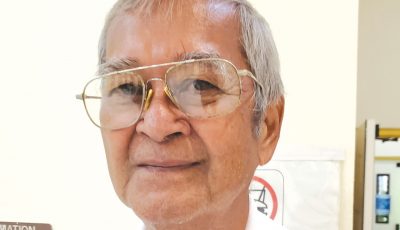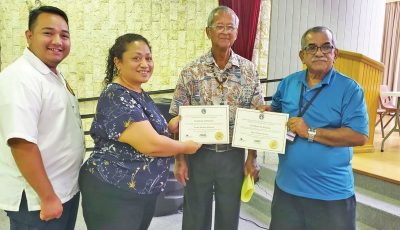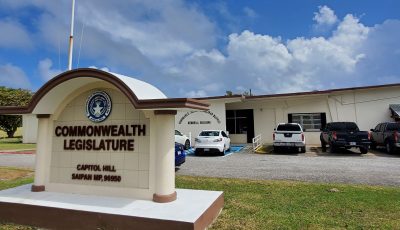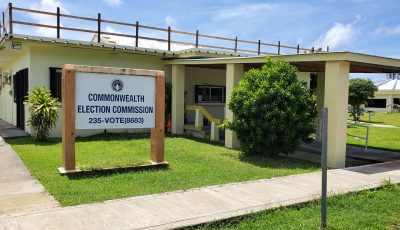Manglona, CEC support passage of bill that seeks efficient elections
Sen. Paul A. Manglona (Ind-Rota) said Wednesday that the Senate should pass a House of Representatives bill that seeks to amend several sections of the NMI Election Law in order to have efficient elections.
Manglona in an interview said the Senate should pass the legislation, H. B. 22-99, HD1, way before the election day of Nov. 8.
The House passed the legislation last July 18 and was transmitted that same day to Senate President Jude U. Hofschneider (R-Tinian).
The Senate Judiciary, Government, Law and Federal Relations Committee chaired by Sen. Karl R. King-Nabors (R-Tinian) is handling the bill. As of press time, Saipan Tribune was still waiting for comments from King-Nabors.
Manglona said it’s a legislation similar to what the Legislature passed two years ago for the COVID-19 pandemic.
“It’s going to save a lot of time and processing hours,” he said.
The senator said in the past election, the processing of absentee ballots consumed a lot of time and therefore the election results were not announced to the public until the next day.
“So if they allow that bill to go through if I’m not mistaken, the bill allows for the receipt of the absentee ballots prior to the last day,” Manglona said.
In response to Saipan Tribune’s inquiry, House vice speaker Rep. Blas Jonathan T. Attao (R-Saipan), who is the author of the bill, said Tuesday that he was not sure what Senate committee is handling the bill, or if the Senate leadership even sent it to a committee.
“But I’m sure the Senate members are aware of the tasks by the Election Commission,” Attao pointed out.
Commonwealth Election Commission executive director Kayla S. Igitol said last week that the bill will expedite the process as they will, among other things, be able to process absentee ballots seven days prior to election day.
“We’re able to tabulate early voting and absentee ballots on election day so it really does speed up the process,” Igitol said.
She said she has been communicating with some senators about the bill.
Attao stated in the bill that Public Law 21-34 signed into law on Sept. 22, 2020, suspended certain CNMI election laws for the 2020 general election to mitigate public health risks due to the COVID-19 pandemic.
He said that law adjusted the early voting time and added more polling places, extended the hours of operations for early voting and election day, and authorized curbside voting and procedures.
Attao said the law also authorized CEC to collect absentee ballots seven days before the general elections and 14 days after, and gave CEC flexibility to make changes to the election procedures if necessary to mitigate public health risk.
He noted that Public Law 21-34 contained a sunset provision that automatically expired on Nov. 18, 2020 or after the certification of the general election results, whichever was later.
The vice speaker said certain expired amendments proved beneficial and advantageous to CEC.
Under Attao’s bill, no less than two persons, one of whom shall be designated by the CEC board chair and the other of whom shall be designed by the CEC executive director, shall go to the designated post office in each senatorial district to collect absentee ballots commencing on the seventh day prior to the general elections and ending on the day of the general elections.
Two persons as designated by the CEC shall compare the signature of the voter on the application for absentee ballot with that on the affidavit and the registration. The current law requires the commission to compare the signature.
Under Attao’s legislation, if the signatures appear to be the same person, if the affidavit is properly completed, and if the envelope is sealed and it does not appear to have been tampered with, the notation OK shall be placed on the return envelope and shall be initialed by the two persons designated by the commission to process the absentee envelopes. The current law requires initials by no less than five commission members.
Under the bill, two signatures of the persons designated by the commission constitute a verification of the discrepancy noted as the cause of rejection on the return envelope. The current law requires five signatures of the commission.
Under the legislation, if the two persons designated by the commission do not agree, the envelope shall be forwarded to the tabulating committee where a majority of the committee will vote to accept or reject the ballot.
If the ballot is rejected, the reason for such rejection shall be written on the envelope. If it is accepted, it shall be counted.
A permanent polling place for early voting must remain open during the hours of 8:30am to 5pm on weekdays and 8:30am to 5pm on Saturdays, and holidays. Polling places may be closed on Sundays at the discretion of the CEC.
CEC may amend the voting days and hours as necessary to accommodate emergency early voting.
The use of electronic devices for recording or taking pictures of the ballot are not allowed within the voting booths.
The accounting of early voting ballots may begin any time after early voting is closed and the counting and tabulation committee is formed.
The accounting of absentee ballots may begin after the first pickup of the ballots on the day of the election or runoff-election provided that the verification of received absentee ballots is completed.



























